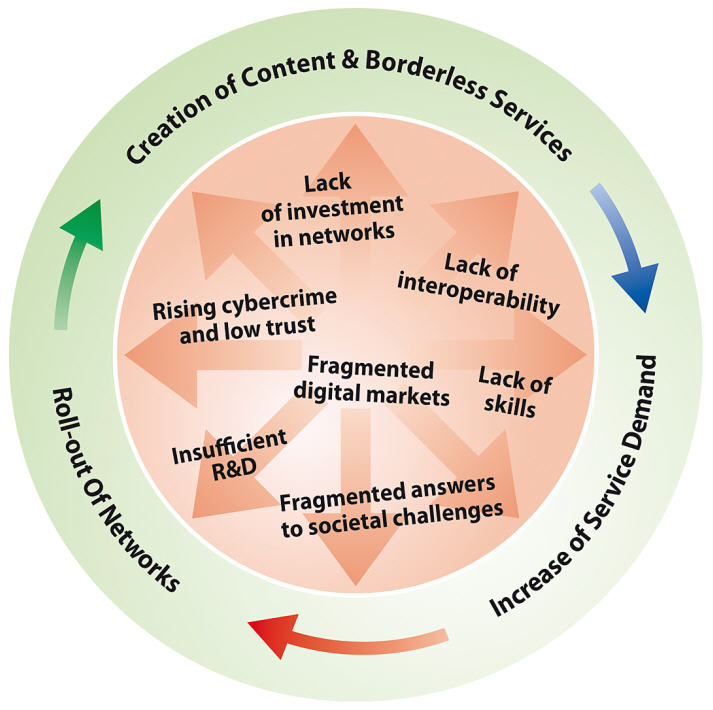To achieve the goals set out in the
Digital Agenda for Europe, the Commission is working closely with national governments, concerned organisations and companies – with an annual
Digital Assembly bringing stakeholders together to assess progress and emerging challenges.
Introduction The overall aim of the Digital Agenda is to deliver sustainable economic and social benefits from a digital single market based on fast and ultra fast internet and interoperable applications. The crisis has wiped out years of economic and social progress and exposed structural weaknesses in Europe's economy. Europe's primary goal today must be to get Europe back on track. To achieve a sustainable future, it must already look beyond the short term. Faced with demographic ageing and global competition we have three options: work harder, work longer or work smarter. We will probably have to do all three, but the third option is the only way to guarantee increasing standards of life for Europeans. To achieve this, the Digital Agenda makes proposals for actions that need to be taken urgently to get Europe on track for smart, sustainable and inclusive growth. Its proposals will set the scene for the longer-term transformations that the increasingly digital economy and society will bring about.
The European Commission launched in March 2010 the Europe 2020 Strategy to exit the crisis and prepare the EU economy for the challenges of the next decade. Europe 2020 sets out a vision to achieve high levels of employment, a low carbon economy, productivity and social cohesion, to be implemented through concrete actions at EU and national levels. This battle for growth and jobs requires ownership at top political level and mobilisation from all actors across Europe.
The Digital Agenda for Europe is one of the seven flagship initiatives of the Europe 2020 Strategy, set out to define the key enabling role that the use of Information and Communication Technologies (ICT) will have to play if Europe wants to succeed in its ambitions for 2020.
The objective of this Agenda is to chart a course to maximise the social and economic potential of ICT, most notably the internet, a vital medium of economic and societal activity: for doing business, working, playing, communicating and expressing ourselves freely. Successful delivery of this Agenda will spur innovation, economic growth and improvements in daily life for both citizens and businesses. Wider deployment and more effective use of digital technologies will thus enable Europe to address its key challenges and will provide Europeans with a better quality of life through, for example, better health care, safer and more efficient transport solutions, cleaner environment, new media opportunities and easier access to public services and cultural content.
The ICT sector is directly responsible for 5% of European GDP, with a market value of € 660 billion annually, but it contributes far more to overall productivity growth (20% directly from the ICT sector and 30% from ICT investments). This is because of the high levels of dynamism and innovation inherent in the sector, and the enabling role the sector plays in changing how other sectors do business. At the same time, the social impact of ICT has become significant – for example, the fact that there are more than 250 million daily internet users in Europe and virtually all Europeans own mobile phones has changed life style.
The development of high-speed networks today is having the same revolutionary impact as the development of electricity and transportation networks had a century ago. With the on-going developments in consumer electronics, the lines between digital devices are fading away. Services are converging and moving from the physical into the digital world, universally accessible on any device, be it a smartphone, tablet, personal computer, digital radio or high-definition television. It is projected that by 2020 digital content and applications will be almost entirely delivered online.
This great potential of ICT can be mobilised through a well-functioning virtuous cycle of activity. Attractive content and services need to be made available in an interoperable and borderless internet environment. This stimulates demand for higher speeds and capacity, which in turn creates the business case for investments in faster networks. The deployment and take-up of faster networks in turn opens the way for innovative services exploiting higher speeds.
The virtuous cycle of the digital economy 
This flow of activity can be largely self reinforcing. It requires a business environment that fosters investments and entrepreneurship. But while the transformational power of ICT is clear, serious challenges must also be confronted in order to harness it.